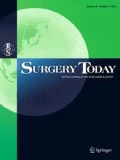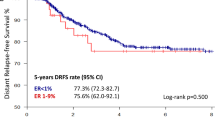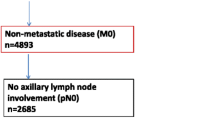Abstract
Purpose
Although improved long-term prognoses for patients with metastatic breast cancer (MBC) have been demonstrated, few reports address overall survival (OS) with sufficient follow-up. Furthermore, the relevance of immunohistological subtypes to OS in MBC has not been clarified.
Methods
We evaluated, retrospectively, the OS of patients who had been initiated on systemic therapy for MBC between 2000 and 2008.
Results
The subjects of this study were 527 patients with MBC treated by systemic therapy. The median survival time (MST) was 55.5 months. The MST for each immunohistological subtype was as follows: luminal, 59.9 months; luminal-HER2, not reached; triple-negative, 18.6 months; and HER2-enriched, 49.9 months. According to multivariate analysis, metastasis-free intervals of ≥2 years and treatment with anthracycline for MBC were predictive of better OS. The predictors of shorter OS included disease progression after first-line treatment for MBC, triple-negative, and all histological factors, except papillotubular carcinoma, with liver metastasis, and having three or more initial metastatic sites.
Conclusions
The prognosis of the patients with MBC in this series was better than that reported before 2000, which is probably attributable to the use of novel, improved pharmacological agents. For example, luminal-HER2 tumors can be treated using both aromatase inhibitors and trastuzumab. Because of the lower toxicities, it is now possible to administer these agents for longer periods, resulting in better prognoses.


Similar content being viewed by others
References
Jemal A, Siegel R, Ward E, Hao Y, Xu J, Murray T, et al. Cancer statistics, 2008. CA Cancer J Clin. 2008;58:71–96.
Matsuda T, Marugame T, Kamo K, Katanoda K, Ajiki W, Sobue T, et al. Cancer incidence and incidence rates in Japan in 2005: based on data from 12 population-based cancer registries in the Monitoring of Cancer Incidence in Japan (MCIJ) project. Jpn J Clin Oncol. 2011;41:139–47.
Early Breast Cancer Trialists’ Collaborative Group. (EBCTCG). Effects of chemotherapy and hormonal therapy for early breast cancer on recurrence and 15-year survival: an overview of the randomised trials. Lancet. 2005;365:1687–717.
Hortobagyi GN. Treatment of breast cancer. N Engl J Med. 1998;339:974–84.
Chia SK, Speers CH, D’yachkova Y, Kang A, Malfair-Taylor S, Barnett J, et al. The impact of new chemotherapeutic and hormone agents on survival in a population-based cohort of women with metastatic breast cancer. Cancer. 2007;110:973–9.
Weide R, Mergenthaler U, Pandorf A, Arndt H, Heymanns J, Thomalla J, et al. Improved survival of patients with metastatic breast cancer in routine care: results of a retrospective study in a community-based oncology group practice 1995–2005. Onkologie. 2009;32:107–13.
Giordano SH, Buzdar AU, Smith TL, Kau SW, Yang Y, Hortobagyi GN. Is breast cancer survival improving? Cancer. 2004;100:44–52.
Gennari A, Conte P, Rosso R, Orlandini C, Bruzzi P. Survival of metastatic breast carcinoma patients over a 20-year period: a retrospective analysis based on individual patient data from six consecutive studies. Cancer. 2005;104:1742–50.
Goldhirsch A, Wood WC, Coates AS, Gelber RD, Thurlimann B, Senn HJ. Strategies for subtypes–dealing with the diversity of breast cancer: highlights of the St Gallen International Expert Consensus on the Primary Therapy of Early Breast Cancer 2011. Ann Oncol. 2011;22:1736–47.
Goldhirsch A, Winer EP, Coates AS, Gelber RD, Piccart-Gebhart M, Thürlimann B, et al. Personalizing the treatment of women with early breast cancer: highlights of the St Gallen International Expert Consensus on the Primary Therapy of Early Breast Cancer 2013. Ann Oncol. 2013;24:2206–23.
Bhargava R, Beriwal S, Dabbs DJ, Ozbek U, Soran A, Johnson RR, et al. Immunohistochemical surrogate markers of breast cancer molecular classes predicts response to neoadjuvant chemotherapy. Cancer. 2010;116:1431–9.
Bastien RR, Rodríguez-Lescure Á, Ebbert MT, Prat A, Munárriz B, Rowe L, et al. PAM50 breast cancer subtyping by RT-qPCR and concordance with standard clinical molecular markers. BMC Med Genomics. 2012;5:44.
Cheang MC, Voduc D, Bajdik C, Leung S, McKinney S, Chia SK, et al. Basal-like breast cancer defined by five biomarkers has superior prognostic value than triple-negative phenotype. Clin Cancer Res. 2008;14:1368–76.
Nielsen TO, Hsu FD, Jensen K, Cheang M, Karaca G, Hu Z, et al. Immunohistochemical and clinical characterization of the basal-like subtype of invasive breast carcinoma. Clin Cancer Res. 2004;10:5367–74.
Calza S, Hall P, Auer G, Bjöhle J, Klaar S, Kronenwett U, et al. Intrinsic molecular signature of breast cancer in a population-based cohort of 412 patients. Breast Cancer Res. 2006;8:R34.
Parker JS, Mullins M, Cheang MC, Leung S, Voduc D, Vickery T, et al. Supervised risk predictor of breast cancer based on intrinsic subtypes. J Clin Oncol. 2009;27:1160–7.
Carey LA, Dees EC, Sawyer L, Gatti L, Moore DT, Collichio F, et al. The triple negative paradox: primary tumor chemosensitivity of breast cancer subtypes. Clin Cancer Res. 2007;13:2329–34.
Sakamoto G, Inaji H, Akiyama F, Haga S, Hiraoka M, Inai K, et al. General rules for clinical and pathological recording of breast cancer 2005. Breast Cancer. 2005;12(Suppl):S1–27.
Ihaka R, Gentleman R. R: a language for data analysis and graphics. J Comp Graph Stat. 1996;5:299–314.
Inoue K, Ogawa M, Horikoshi N, Aiba K, Mukaiyama T, Mizunuma N, et al. Evaluation of prognostic factors for 233 patients with recurrent advanced breast cancer. Jpn J Clin Oncol. 1991;21:334–9.
Rivera E. Management of metastatic breast cancer: monotherapy options for patients resistant to anthracyclines and taxanes. Am J Clin Oncol. 2010;33:176–85.
Jones SE. Metastatic breast cancer: the treatment challenge. Clin Breast Cancer. 2008;8:224–33.
Moreno-Aspitia A, Perez EA. Treatment options for breast cancer resistant to anthracycline and taxane. Mayo Clin Proc. 2009;84:533–45.
Seshadri R, Firgaira FA, Horsfall DJ, McCaul K, Setlur V, Kitchen P. Clinical significance of HER-2/neu oncogene amplification in primary breast cancer. The South Australian Breast Cancer Study Group. J Clin Oncol. 1993;11:1936–42.
Kaufman B, Mackey JR, Clemens MR, Bapsy PP, Vaid A, Wardley A, et al. Trastuzumab plus anastrozole versus anastrozole alone for the treatment of postmenopausal women with human epidermal growth factor receptor 2-positive, hormone receptor-positive metastatic breast cancer: results from the randomized phase III TAnDEM study. J Clin Oncol. 2009;27:5529–37.
Koeberle D, Ruhstaller T, Jost L, Pagani O, Zaman K, von Moos R, et al. Combination of trastuzumab and letrozole after resistance to sequential trastuzumab and aromatase inhibitor monotherapies in patients with estrogen receptor-positive, HER-2-positive advanced breast cancer: a proof-of-concept trial (SAKK 23/03). Endocr Relat Cancer. 2011;18:257–64.
Tanaka K, Tokunaga E, Yamashita N, Taketani K, Akiyoshi S, Morita M, et al. A luteinizing hormone-releasing hormone agonist plus an aromatase inhibitor as second-line endocrine therapy in premenopausal females with hormone receptor-positive metastatic breast cancer. Surg Today. 2014;44:1678–84.
Santinelli A, Pisa E, Stramazzotti D, Fabris G. HER-2 status discrepancy between primary breast cancer and metastatic sites. Impact on target therapy. Int J Cancer. 2008;122:999–1004.
Amir E, Miller N, Geddie W, Freedman O, Kassam F, Simmons C, et al. Prospective study evaluating the impact of tissue confirmation of metastatic disease in patients with breast cancer. J Clin Oncol. 2012;30:587–92.
Acknowledgments
We thank Chizuko Tsutsumi, Takayo Fukuda, Shinichiro Taira, Yoko Chihara, Nahomi Tokudome, and Masujiro Makita for data collection and assembly.
Author information
Authors and Affiliations
Corresponding author
Ethics declarations
Conflict of interest
Kokoro Kobayashi and her co-authors have no conflicts of interest.
Rights and permissions
About this article
Cite this article
Kobayashi, K., Ito, Y., Matsuura, M. et al. Impact of immunohistological subtypes on the long-term prognosis of patients with metastatic breast cancer. Surg Today 46, 821–826 (2016). https://doi.org/10.1007/s00595-015-1252-x
Received:
Accepted:
Published:
Issue Date:
DOI: https://doi.org/10.1007/s00595-015-1252-x




